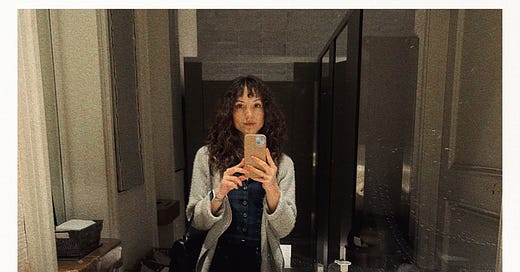This month, I wanted to tackle a word most of us would rather avoid—a word tha can be summed up by a single letter: F for failure. Hearing that word can send a chill down my spine, because it can so easily make me question just about everything that has led me to this point. Failure is that lurking shadow we all try to dodge, thanks to the message drilled into us from an early age: failure equals personal flaw. Bombed a test? Clearly, you didn’t study hard enough. Didn’t get cast in the play? Must not have wanted it enough to give your best. The list could go on forever. And let’s be honest, as humans, we’re pros at justifying and at taking things personally. We tend to hold onto negative comments and experiences way faster than the positive ones
When I first joined my acting class, I was told to do something that felt almost unthinkable: 'follow everything into the ground.' Essentially, this meant following my instincts fully in each moment to see if I was on a path worth pursuing and then deciding if it was time to pivot. For a perfectionist constantly striving to please, the thought made me want to crawl out of my own skin. There was plenty of irony, of course, in someone so used to navigating life by grades and achievements deciding to pursue acting—a world with no clear steps or predictable outcomes. This class became the foundation for rethinking my understanding of failure.Though my relationship with failure has been contentious, I’ve been able to find moments of peace with it, and even a sense of gratitude.
Are you there Ren? It’s me, failure
For me, failure has been the thing that I’ve always tried to avoid. I've feared that stumbling would somehow define my worth as a person. I grew up seeing failure as a reflection of my abilities and, by extension, my value. Honestly, that dreaded F-word is probably why horror films don’t scare me much. Sure, being chased by a guy with a chainsaw is unsettling, but have you ever faced planted going after something you really wanted? If a vaccine for failure existed, I’m pretty sure my childhood would’ve made those shots mandatory.
People often say this stigma around failure is generational, but I think it runs deeper. It’s tied to our culture’s love of success and our fear of vulnerability. Maybe we’re a little more forgiving of our own mistakes these days, but we’re still just as tough when it comes to the standards we set for ourselves—and often quicker to deflect responsibility when things don’t work out. What’s still missing in all of that are the positive sides of failure: how it means we’ve taken a risk or tried something new, or even discovered our strengths in ways we wouldn’t have otherwise. Failure can be a reminder of our resilience—the ability to get back up, if we’re willing to recognize that strength within ourselves.
There’s a quote, inspired by a Chinese proverb, that says, 'Smart people learn from their own mistakes, while wise people learn from the mistakes of others.' I’ve loved this quote for a long time and still agree with much of it, but over time, it became a my justification for being harder on myself when things didn’t work out. For as long as I can remember, I’ve
Keep reading with a 7-day free trial
Subscribe to Sobremesa to keep reading this post and get 7 days of free access to the full post archives.





